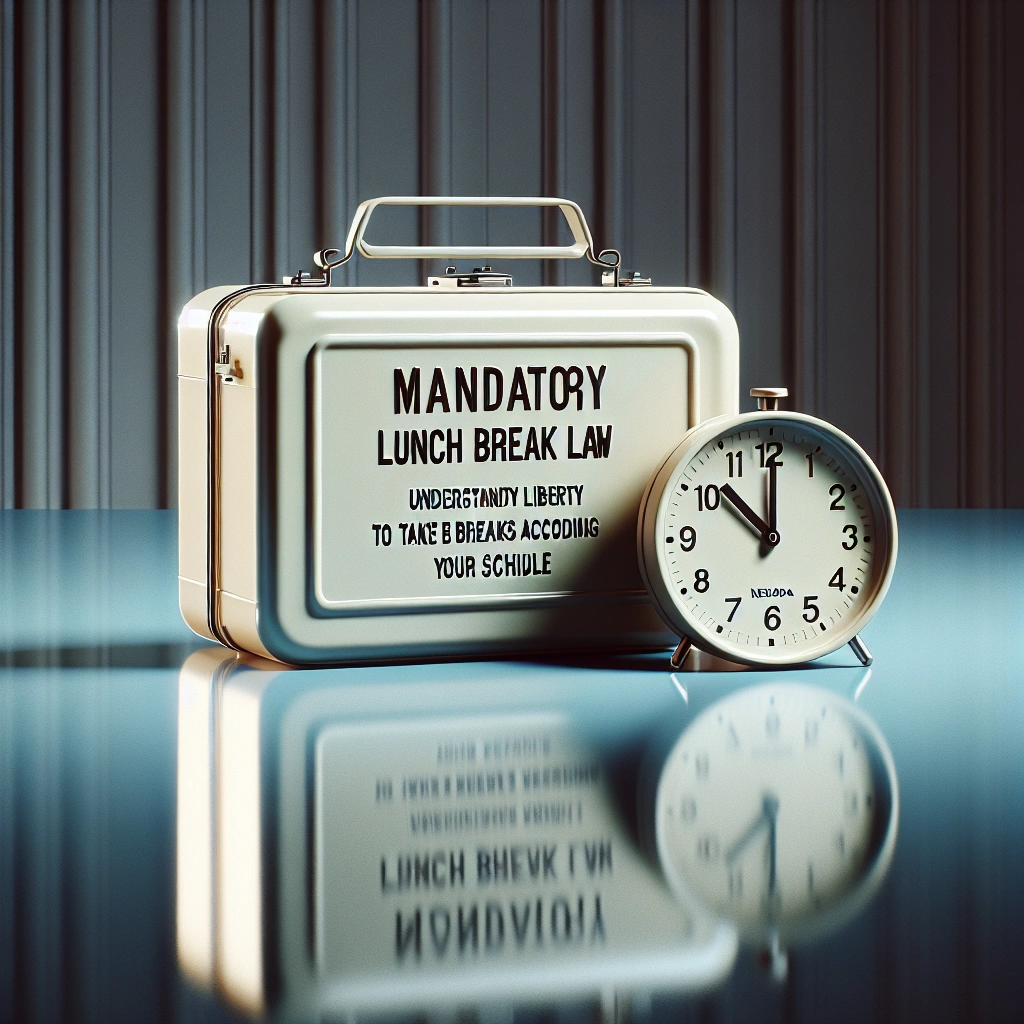Nevada Lunch Break Law: What You Need To Know
Short Answer for “nevada lunch break law”
Yes, Nevada labor laws mandate that employers must offer a 30-minute uninterrupted meal break for employees scheduled to work eight or more continuous hours, as well as a 10-minute rest period for every four hours worked, paid by the employer.
Check out this Youtube video: “Do Nevada Employers Have to Give Breaks for Rest, Meals…” to understand the Nevada lunch break law and your rights as an employee in the state.
Key Takeaways
-
Nevada labor laws mandate that employers must offer a 30-minute uninterrupted meal break for employees scheduled to work eight or more continuous hours.
-
Employees are entitled to a 10-minute rest period for every four hours worked, which should be uninterrupted and paid by the employer.
-
Circumstances where meal and rest breaks are not required include working less than 3.5 hours in a day and business necessity preventing employers from providing rest breaks.
-
Employees in Nevada have the right to seek redress for denied rest breaks by filing a complaint, engaging in negotiations, filing a wage claim, or filing a lawsuit as a last resort.
-
It is crucial for both employers and employees to understand the exceptions to the break requirements and to ensure compliance with the Nevada lunch break law.

Nevada Meal Breaks and Rest Periods
Nevada labor laws require employers to provide a 30-minute uninterrupted meal break for employees scheduled to work eight or more continuous hours, to be given within the first five hours of work. If an employee cannot take a full 30-minute meal break, they must be compensated at the regular rate of pay. Additionally, employees are entitled to a 10-minute rest period for every four hours worked, to be paid by the employer. During meal breaks, employees should be relieved of all job duties, while rest periods are considered as work hours and must be compensated accordingly.
Nevada laws on meal breaks
Nevada labor laws mandate that employers must offer a 30-minute uninterrupted meal break for employees scheduled to work eight or more continuous hours. This break must be given within the first five hours of work. If the nature of the work prevents an employee from taking a full 30-minute meal break, they must be compensated for their time at the regular rate of pay. Employers should ensure that employees are relieved of all job duties during this break without any interference.
Nevada laws on rest periods
According to Nevada Revised Statutes section 608.019, employees are entitled to a 10-minute rest period for every four hours worked or major fraction thereof. These rest periods must be uninterrupted and paid by the employer, and they should be scheduled in the middle of the work period whenever possible. It’s important to note that these rest periods are considered as work hours and must be compensated accordingly.
Working during meal and rest breaks
Employees in Nevada have the right to be free from any work-related tasks during their meal breaks. However, if the employee voluntarily chooses to work or is required to remain on the employer’s premises during the meal period, the employer is obligated to pay for that time.
On the other hand, rest periods are considered paid time, and employees should not engage in work-related activities during this time.
| Break Type | Duration | Frequency | Compensation |
|---|---|---|---|
| Meal Break | 30 minutes | for 8 or more continuous hours of work | Uninterrupted and unpaid, unless work interferes |
| Rest Period | 10 minutes | for every 4 hours worked | Uninterrupted and paid by the employer |

Exceptions to the Break Requirements
In Nevada, there are specific circumstances where meal and rest breaks are not mandated for employees. These exceptions are crucial for employers to understand for compliance with the Nevada lunch break law.
Circumstances where meal and rest breaks are not required in Nevada
| Circumstance | Explanation |
|---|---|
| Less than 3.5 hours of work in a day | When an employee’s total work time for the day is less than three and a half hours, breaks are not required. |
| Business necessity | Employers can seek exemption from rest break requirements if they can demonstrate that business necessity prevents them from providing rest breaks. |
| Middle of the work period | It is suggested that paid ten-minute rest breaks for every four hours or major fraction thereof the employee works are provided in the middle of the work period, if practicable. |
These exceptions reflect specific scenarios outlined by the Nevada Revised Statutes and Administrative Code, providing clarity for both employers and employees regarding when meal and rest breaks are not obligatory.
Legal Actions for Rest Breaks in Nevada
Filing a complaint with the Nevada Office of the Labor Commissioner, engaging in negotiations with the employer, filing a wage claim, and considering a lawsuit are all viable legal actions for seeking resolution and compensation for denied rest breaks in Nevada. These steps are essential for addressing the issue and ensuring that employees are able to receive their legally mandated rest periods.
Filing a complaint
In Nevada, if you have been denied rest breaks at work, filing a complaint is the first crucial step in seeking resolution. Begin by documenting the instances where you were deprived of your legally mandated rest periods. Keep detailed records of the dates, times, and durations of the denied breaks. Additionally, gather any supporting evidence such as emails, schedules, or witness testimonies. You can then file a formal complaint with the Nevada Office of the Labor Commissioner. Be sure to provide all relevant documentation and information required for effective processing of your complaint.
Negotiations
Engaging in negotiations with your employer can offer an opportunity to resolve the rest break issue amicably. Initiate a conversation with your employer or human resources department to address the lack of paid rest breaks. Clearly communicate your concerns and discuss potential solutions. When negotiating, maintaining a professional and tactful approach can be instrumental in reaching a mutually acceptable resolution. Keeping records of the negotiations and any agreements reached is essential for future reference.
Filing a wage claim
If negotiations prove ineffective, filing a wage claim may be necessary to seek compensation for the unpaid rest breaks. Employees in Nevada have the right to file a wage claim with the Office of the Labor Commissioner to recover any wages owed due to denied rest periods. When filing a wage claim, ensure that you submit all pertinent details and evidence to substantiate your claim, including records of your work hours and the corresponding unpaid rest breaks.
Filing a lawsuit
When all other avenues have been exhausted, filing a lawsuit becomes a viable option to address the issue of denied rest breaks. However, it is advisable to seek legal counsel before commencing with a lawsuit. An experienced employment attorney can provide guidance on the legal process and represent your interests effectively. Filing a lawsuit should be considered as a last resort, but it can be an essential step in seeking redress for the denial of legally mandated rest breaks.
| Heading | Importance |
|---|---|
| Filing a complaint | Essential for initiating the resolution process |
| Negotiations | Provides an opportunity for amicable resolution |
| Filing a wage claim | Necessary for seeking compensation for unpaid rest breaks |
| Filing a lawsuit | A final recourse for seeking legal redress |

Conclusion
The Nevada lunch break law mandates that employers must provide a 30-minute uninterrupted meal break for employees scheduled to work eight or more continuous hours. Additionally, employees are entitled to a 10-minute rest period for every four hours worked, which should be uninterrupted and paid by the employer.
It is crucial for employers to understand the exceptions to these break requirements, such as circumstances where meal and rest breaks are not mandated. By adhering to these laws and regulations, both employers and employees can ensure compliance with the Nevada lunch break law.
In instances where employees have been denied their legally mandated rest periods, there are specific actions that can be taken to seek resolution. Filing a complaint with the Nevada Office of the Labor Commissioner is the first crucial step, followed by engaging in negotiations with the employer to address the issue amicably.
If negotiations prove ineffective, employees have the right to file a wage claim to seek compensation for the unpaid rest breaks. As a last resort, filing a lawsuit can be considered to seek legal redress for the denial of legally mandated rest breaks.
It is important for employees to keep detailed records of the instances where they were deprived of their legally mandated rest periods, as well as any supporting evidence such as emails, schedules, or witness testimonies. Additionally, maintaining a professional and tactful approach during negotiations is instrumental in reaching a mutually acceptable resolution.
By following these steps and seeking legal counsel if necessary, employees in Nevada can effectively address the issue of denied rest breaks and seek appropriate redress.
Reference Links
- https://www.employmentlawhandbook.com/employment-and-labor-laws/states/nevada/wage-and-hour/
- https://bwlawonline.com/blog/employee-rights/wage-hour-claim-nv/
- https://www.leg.state.nv.us/nac/nac-608.html
- https://piccololawoffices.com/does-a-nevada-employer-have-to-give-breaks-for-meals-rest-and-sleep/
